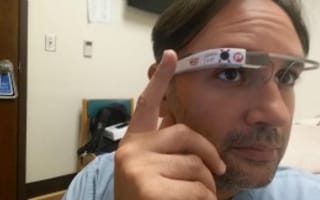
Created by accident in the late 1960s, the Post-it note may be one of the simplest inventions ever. But this very simplicity is what makes it so brilliant. It’s a brightly colored piece of paper within your field of vision that reminds you of things you might otherwise forget. What’s not to like? The idea is so simple — and so good — that computers come with pre-installed widgets that display virtual Post-its on your desktop.
But the jobs where forgetting stuff has the most severe consequences — like trauma surgery — don’t take place at desks or on computers. Moreover, since every trauma is different, the information required to get a successful outcome will differ on a case-by-case basis. So how do you bring trauma surgery teams the information they need when they need it?
VIZR, a Chicago-based health tech company, thinks wearables may be part of the solution.
Launched in November 2015, VIZR was founded by former hospital administrator Richard Buchler and Dr. Alex Guerrero (pictured above) — a trauma surgeon. In his job, Guerrero carried best practices checklists on notecards that he’d constantly review while waiting to enter the operating room. When Google launched its Glass program in 2013, Guerrero saw an opportunity to bring his checklists along to the operating table.
He was drawn to Google Glass because it takes voice commands, and because it can give prompts and reminders to the user without being too obtrusive. As long as the wearer is looking down at the patient, the device is out of sight, but referencing charts and checklists is as easy as looking slightly up and to the right. In addition to these lists, Guerrero also wanted to set timers that remind surgeons to take a step back and reassess the situation every 10 minutes — an established best practice in trauma care.
After getting a prototype platform built and using it clinically for about six months, Guerrero found that the device helped him improve compliance with recommended guidelines significantly. For instance, the gold standard for clearing a patient in the trauma bay — assessing an incoming patient to determine whether they need to go into surgery, be sent to the intensive care unit or be sent home — is to do the whole process in 20 minutes. Guerrero could meet that deadline about 30 to 40 percent of the time. Using VIZR, he’s getting close to 100 percent.
“In trauma, for every three minutes you save, mortality goes down by one percent,” said CEO Richard Buchler. “A 30 minute delay — which is very common in hospitals — can mean you’re 10 percent more likely to die.”
 Beyond improving daily routines, the technology can also be helpful by bringing up reference materials for unusual situations. For instance, procedures for assessing and treating pregnant trauma patients differ significantly from those for other patients. But many trauma surgeons only come across a pregnant patient a handful of times over the course of a career, and may need to consult reference materials along the way.
Beyond improving daily routines, the technology can also be helpful by bringing up reference materials for unusual situations. For instance, procedures for assessing and treating pregnant trauma patients differ significantly from those for other patients. But many trauma surgeons only come across a pregnant patient a handful of times over the course of a career, and may need to consult reference materials along the way.
VIZR’s platform also provides guidance to nurses in room prep and setting up equipment, the hands-free interface being a major benefit for processes that often require two hands.
To ensure HIPAA compliance, VIZR has shut off its devices’ camera, WiFi and Bluetooth connectivity. As a bonus, this extends battery life to about eight hours. (Short battery life has been a common complaint among Google Glass users.)
A member of Chicago’s MATTER incubator, Buchler said his company has benefited greatly from working with other Chicago health tech companies in developing strategies for gaining traction in the sector. The company is also in talks with potential clients in the industrial and oil and gas-sectors about applications outside medicine.
To ensure maximum flexibility, VIZR’s platform includes a web application where users can develop their own modules. These modules can in turn be licensed out to other users for a royalty fee, incentivizing users to share their tools with others.
Images via VIZR Tech.
Have a tip for us or know of a company that deserves coverage? Shoot us an email or follow us on Twitter @BuiltInChicago.



